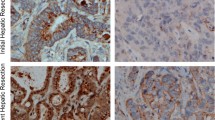Abstract
Background: p125FAK, pp60c-src, and pp62c-yes are protein tyrosine kinases that function in signaling pathways regulating cell adhesion, migration, and growth. The expression and tyrosine kinase activities of pp60c-src and pp62c-yes, and the expression of p125FAK are increased in colorectal tumor metastases relative to normal mucosa. This study investigates whether differences in the activation of pp60c-src and pp62c-yes in colorectal liver metastases correlated with differences in p125FAK expression and whether prognostic significance could be demonstrated from the extent of expression of p125FAK in metastases.
Methods: Activities of pp60c-src and pp62c-yes were measured in the immune complex kinase assay. Relative levels of p125FAK, pp60c-src, and pp62c-yes were determined by immunoblotting.
Results: p125FAK was overexpressed in 29 of 30 colorectal cancer liver metastases (range of two- to 195-fold increase compared with normal mucosa). The degree of overexpression of p125FAK was not a significant prognostic factor in survival. A differential activation of pp60c-src and pp62c-yes in colorectal carcinoma liver metastases was observed. However, overexpression of p125FAK was observed in metastases with either pp60c-src or pp62c-yes activated in colorectal carcinoma liver metastases.
Conclusions: p125FAK overexpression appears to be a marker present in colorectal cancer cells with a metastatic phenotype. Furthermore, p125FAK overexpression is independent of pp60c-src or pp62c-yes activation in human colorectal carcinoma liver metastases.
Similar content being viewed by others
References
Nicolson GL. Cancer metastasis: tumor cell and host organ properties important in metastasis to specific secondary sites.Biochem Biophys Acta 1988;948:175.
Poste G. Pathogenesis of metastatic disease: implications for current therapy and for the development of new therapeutic strategies.Cancer Treat Rep 1986;70:183–199.
Ilic D, Furuta Y, Kanazawa S, et al. Reduced cell motility and enhanced focal adhesion contact formation in cells from FAK-deficient mice.Nature 1995;377:539–44.
Talamonti MS, Roh MS, Curley SA, Gallick GE. Increase in activity and level of pp60c-src in progressive stages of human colorectal cancer.J Clin Invest 1993;91:53–60.
Zetter BR. Adhesion molecules in tumor metastasis.Semin Cancer Biol 1993;4:219–29.
Rosales C, O'Brien V, Kornberg L, Juliano R. Signal transduction by cell adhesion receptors.Biochim Biophys Acta 1995;1242:77–98.
Richardson A, Parsons JT. Signal transduction through integrins: a central role for focal adhesion kinase.Bioessays 1994;17:229–36.
Meredith JEJ, Fazeli B, Schwartz MA. The extracellular matrix as a cell survival factor.Mol Biol Cell 1993;4:953–61.
Guan JL, Shalloway D. Regulation of focal adhesion-associated protein tyrosine kinase by both cellular adhesion and oncogenic transformation.Nature 1992;358:90–92.
Owens LV, Xu L, Craven RJ, et al. Overexpression of the focal adhesion kinase (p125FAK) in invasive human tumors.Cancer Res 1995;55:2752–5.
Calalb MB, Polte TR, Hanks SK. Tyrosine phosphorylation of focal adhesion kinase at sites in the catalytic domain regulates kinase activity: a role for Src family kinases.Mol Cell Biol 1995;15:954–63.
Weiner TM, Liu ET, Craven RJ, Cance WG. Expression of focal adhesion kinase gene and invasive cancer.Lancet 1993;342:1024–5.
Owens LV, Xu L, Dent GA, et al. Focal adhesion kinase as a marker of invasive potential in differentiated human thyroid cancer.Ann Surg Oncol 1996;3:100–105.
Schaller MD, Hildebrand JD, Shannon JD, Fox JW, Vines RR, Parsons JT. Autophosphorylation of the focal adhesion kinase, pp125FAK directs SH-2 dependent binding of pp60c-src.Mol Cell Biol 1994;14:1680–8.
Zhao Y, Krueger JG, Sudol M. Expression of cellular-yes protein in mammalian tissues.Oncogene 1990;5:1629–35.
Cartwright CA, Coad CA, Egbert BM. Elevated c-src tyrosine kinase activity in premalignant epithelia of ulcerative colitis.J Clin Invest 1994;93:509–15.
Park J, Meisler AI, Cartwright CA. c-yes tyrosine kinase activity in human colon carcinoma.Oncogene 1993;8:2627–35.
Han NM, Curley SA, Gallick GE. Differential activation of pp60c-src and pp62c-yes in human carcinoma liver metastases.Clin Cancer Res 1996;2:1397–1404.
Author information
Authors and Affiliations
Rights and permissions
About this article
Cite this article
Han, N.M., Fleming, R.Y.D., Curley, S.A. et al. Overexpression of focal adhesion kinase (p125FAK) in human colorectal carcinoma liver metastases: Independence from c-src or c-yes activation. Annals of Surgical Oncology 4, 264–268 (1997). https://doi.org/10.1007/BF02306620
Received:
Accepted:
Issue Date:
DOI: https://doi.org/10.1007/BF02306620




